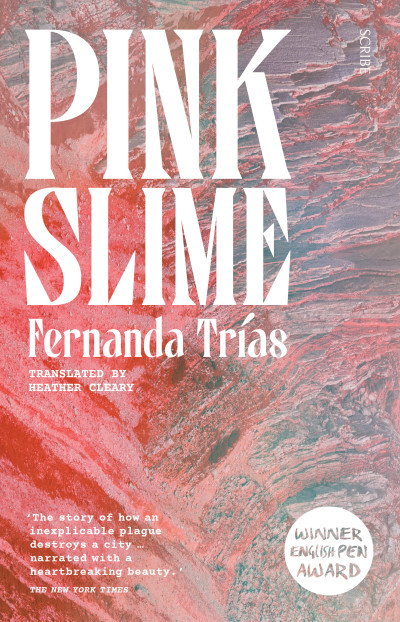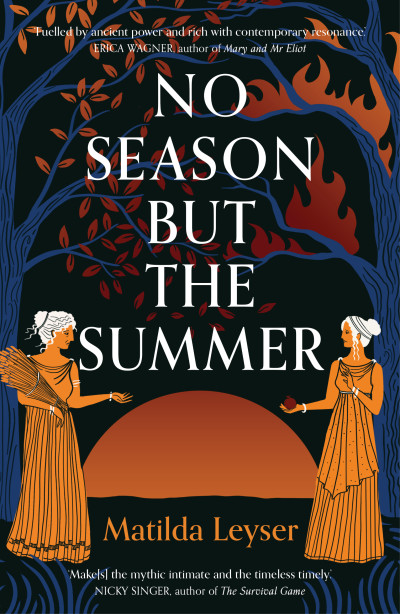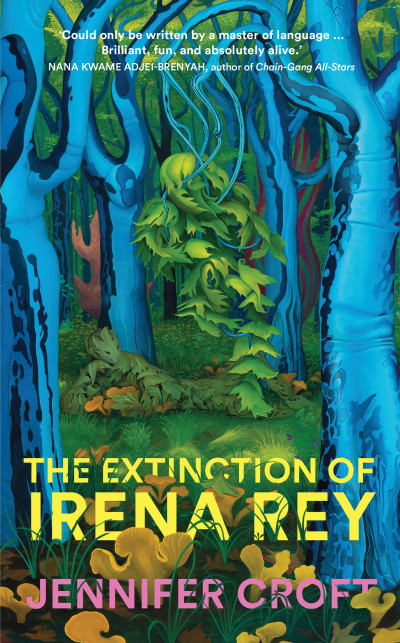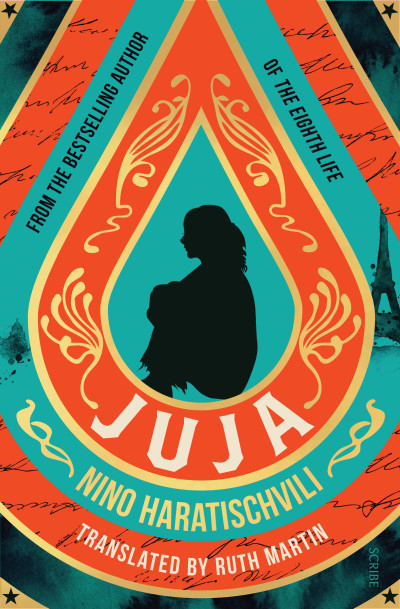‘[T]his ominous novel predicts a universe similar to the one that began with the pandemic, one charged with contradictory uncertainties, and it acts like a potential environment where the author can take her obsessions to the extreme and once again consolidate the oppressive and suffocating form that stands out in all of her work.’
Leonor Courtoisie, Latin American Literature Today
‘She breaks through parameters, shatters expectations, breaks down internal walls like that invading algae that changes the lives of the residents in the town. Almost like Rulfo in Comala. A poetic and tenacious whirlwind, dreadful and sublime … An extraordinary work!’
Aura Lucía Mera, El País
‘Unsettling and unpredictable, Uruguayan writer Fernanda Trías’s new novel describes not merely a dystopia but a full-on Technicolor apocalypse.’
Stuart Kelly, The Scotsman
‘Pink Slime is a powerful novel — short phrases, unusual poetic twists, the attachment to human ties as a reason to overcome chaos, the insistence of love over heartbreak despite everything. An extraordinary dystopian novel. Highly recommended.’
Gioconda Belli, author of
The Country Under My Skin
‘Halfway between a classic dystopia like 1984 or Farenheit 451 and one of the great catastrophe novels by J.G. Ballard like The Drowned World or The Drought… Always intense and evocative, and with a subtle construction of layers and mechanisms, this new novel by Fernanda Trías transcends genres and installs itself in a unique territory, at the border of horror without fully sinking into that abyss … Trías’s prose, precise and elegant, is able to bravely look into the abyss with tenderness in the same breath, to return to the central themes of what it means to be human in our culture, and, at the same time, to participate in the contemporary debate about the place that this humanity occupies in a world of crisis. Fernanda Trías has created a mirror where we can see these strange times we are having to live through, and has given her faithful readers the best out of all her novels.’
Ramiro Sanchiz, literary critic, translator, and author of Trashpunk
‘A fascinating, astutely written novel. Pink Slime is both a successful portrait of societal gluttony and a bold exploration of the ambiguities of care.’
Partick Graney, Literary Review
‘Latin American fantastika is in the midst of a remarkable renaissance … The latest of this string of exhilarating new books to find its way into English is Uruguayan novelist Fernanda Trias’s Pink Slime… Ecological collapse generates moments of startling beauty that are hauntingly captured by Heather Cleary’s elegant translation.’
James Bradley, The Saturday Paper
‘[A]n extremely powerful metaphor of an emotional world in crisis where everything is about to collapse, held together by the weak threads of memory, tenderness, solidarity, and the effort to make it to a place where life is different. The language is charged with poetic breath but never loses its tie to the concrete, wisely leaning on the details. Reading this novel is both stimulating and disturbing, and after closing it, its images will continue chasing us for a long time, charged with beauty and melancholy. Truly extraordinary.’
Piedad Bonnett, poet, dramaturg, novelist, and memoirist
‘Trías’s gaze … —her quiet and disquieting writing, poetic and precise — creates cracks and escapes all over the place: in the hearts of her creatures, in their relationships, in the damaged world.’
Giuseppe Caputo, author of An Orphan World
‘No one writes like Fernanda Trías. Reading her is like watching a revelation or an undressing. That revelation starts gradually and irresistibly, phrase by phrase, until you realise that you are the one being undressed.’
Daniel Mella, author of Older Brother
‘Time in the haunting, elegiac Pink Slime loops in and around itself. Reading it is like constantly being assailed by a sense of déjà vu; passages are repeated, events of the past are re-examined from different angles. The narrator and, by extension, Trías are fixated on ways of measuring time — what marks the beginning, middle and end of the world, of a narrative? … Pink Slime is a potent allegory of climate change. As the narrator tells us at the end: “I cannot stop a future that has already happened”.’
Sonia Nair, Kill Your Darlings
‘[A]n agonisingly beautiful read.’
Natalia Figueroa Barroso, Mascara Literary Review
‘An intimate, melancholic look at an ecologically ravaged future.’
Silvia Moreno-Garcia, author of Mexican Gothic and Silver Nitrate
‘In spite of the grim scenario in Pink Slime, there is much beauty in the words of Fernanda Trias’s narrator and in her sensitive, questioning nature … Pink Slime is a remarkable book, and Heather Cleary’s translation does full justice to the poetic prose which conveys the resilience, love and hope of the narrator: something, surely, that we all need in this ever-changing world.’
Ann Skea, The Newtown Review of Books
‘The novel captivates … Readers will be gripped.’
Publishers Weekly, starred review
‘Pink Slime is a dystopia all too near to us, in which human connections and sadness over the end matter more than any explanation of the fog and disease that shroud everything. Trías’s writing, precise and poetic, turns this beautiful novel into a toxic dream, into a meditation on ruins, bodies, and solitude.’
Mariana Enríquez, author of Our Share of Night
‘Like a faintly distorting mirror, Pink Slime reflects back to us the image of a dying world. In this country, abandoned by God and government, the only consolation is the compassion and silent heroism of a few human beings. With her meticulous prose and the painful lucidity characteristic of her work, Fernanda Trías immerses us in a dystopia that expands around us like a poisonous perfume.’
Guadalupe Nettel, author of Still Born, shortlisted for the 2023 Booker Prize
‘Like a nightmare, like an omen, like the lines of an exquisite poem, Pink Slime echoes in my memory long after I read it. A book has never been so relevant, necessary, painful, and simply splendid.’
Jazmina Barrera, author of Cross-Stitch
‘This is a stunningly dark novel, but a beautiful one; Trías’ prose and Cleary’s translation perfectly capture what it feels like to live in an epidemic … This is a knockout of a story. Stunning writing makes this a startlingly powerful novel.’
Kirkus Reviews
‘A compelling tale with an unhurried pace that is striking for how it juxtaposes lyricism with banality … With her eerie and unnervingly probable plot, strong narrative voice, and focus on the small, beautiful moments of life amid disaster, Trías’s tale will continue to haunt readers long after they turn the final page. Pair it with other thoughtful and subtle horror stories such as Sealed by Naomi Booth or Fever Dream by Samanta Schweblin.’
Library Journal, starred review
‘Uruguayan author Trías presents a bleak dystopian novel narrated by an unnamed woman living in an unnamed South American city near the coast … Despair, arbitrariness, and resignation shape this unnerving tale about facing environmental destruction.’
Booklist
‘A genuinely unsettling example of eco/body horror that’s also a commentary on motherhood … A beautiful elegiac meditation on parenting — in this case, the deep connection between a mother and son.’
Locus Magazine
Praise for The Rooftop:
‘At its core, it’s a story about being trapped and the fear, isolation, and anxiety that emerge when one is stuck in a dark, dark place. A tiny, shocking book about despair and its haunting consequences.’
Kirkus Reviews
Praise for The Rooftop:
‘Trías deftly turns her brief fiction into universal parable.’
Shelf Awareness
Praise for The Rooftop:
‘A chilling tour-de-force by one of the most exciting and subversive voices writing today in Latin America.’
Morning Star




















